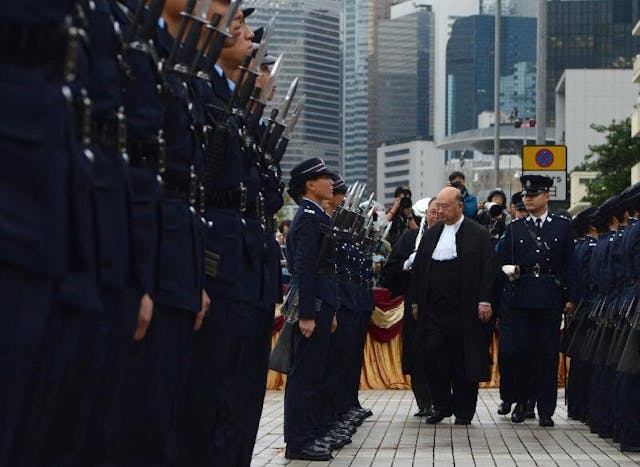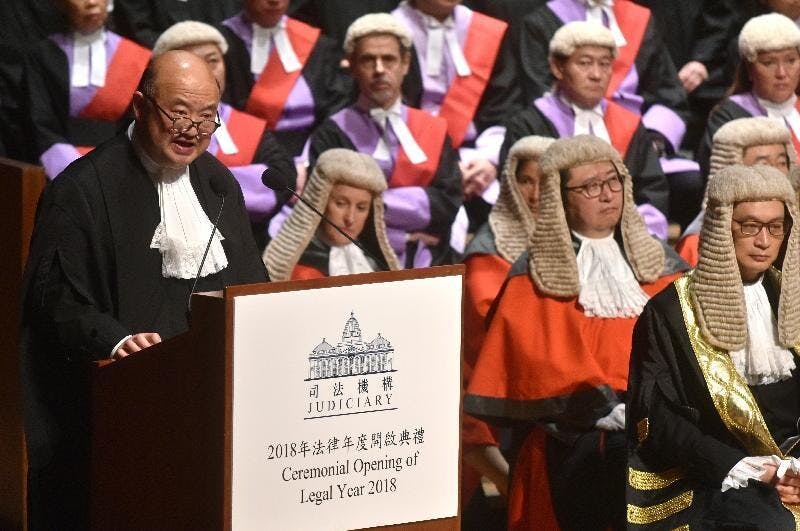編按:以下是終審法院首席法官馬道立昨日(1月8日)在2018年法律年度開啟典禮上發表的演辭中文譯本全文,英文版附於文末:
律政司司長、大律師公會主席、律師會會長、各位尊貴的嘉賓:
我謹代表香港特別行政區司法機構全體仝人熱烈歡迎各位蒞臨今年的法律年度開啟典禮。這是一個重要的場合,讓司法機構對香港司法工作的各方面發表意見。今天,我想談談在香港法庭的運作的透明度、在取得正確理解的基礎下評論法院工作的重要性和好處、興建新法院大樓的計劃、提高法官退休年齡,以及法庭的保安。這些都是司法工作不同的範疇。
香港的法律制度是普通法制度。這制度在香港已經運作了近180年,貢獻社會良多,促成香港多年來的成就。這制度不僅在金融或商業方面,就是對整體社會上每個人而言,都是確保香港的成功得以持續下去的關鍵。《基本法》明文訂明香港實施普通法,而《基本法》的一些條文,不論直接或間接地,都顯然只是與普通法制度有關。普通法制度一直被認為是適合香港社會的法律制度。香港亦是廣受認同的普通法適用地區。
案例法或必須遵循判例的法律原則是普通法的特徵之一,它或許亦是最常用以代表普通法的特徵。這項原則有其實際用途。它確保法律的可肯定性,即類似的法律情況會以類似的方式處理。這不僅為商業交易帶來確切性,亦可使普羅大眾在可肯定的基礎上進行日常事務。
法制透明 是法律體系重要一環
案例法的基石是法庭詳述判決理由的判案書。法庭具有秉行公義的職責,有責任在對一些權利作出裁決時,給予正當和詳盡的理據。法庭不論是判決刑責,或是審理財產權益或法律責任,單單作出裁決並不足夠,而是必須詳盡說明結論背後的理據。我們常強調,法庭裁決法律糾紛時,只考慮案件的法律上理據。是故,法官有責任仔細分析這些法律上理據,充分述明裁決的法律理據。這點相當重要,因為提供詳盡理由的判案書可確保法庭絕對是只遵照法律判案,而別無其他考慮。至為重要的是讓人人看到法律是法庭裁決法律糾紛的關鍵,在過程中不受外來因素影響。
《基本法》訂明香港特別行政區享有並獲賦予「獨立審判權」。「獨立」一詞是指司法獨立。香港有獨立的司法機構。「審判權」指法庭獲賦予權力,行使法律以裁決糾紛,包括作出可被強制執行的判決的權力,例如作出支付款項的命令、宣告某些權利是否存在、宣告某些公共行為因違憲無效、或在刑事法律程序中判處被定罪的人監禁。由此可見,執行法律包含施加法律制裁的權力。我去年已談及象徵公義的泰美斯女神雕像,她是一手持天平,另一手持長劍。
司法機構既肩負這些重任,它的工作就必須對公眾完全透明。香港普通法制度具透明度這項特徵可從兩方面清楚得見。首先,必須注意的是幾乎所有在香港法庭(從裁判法院以至終審法院)的法律程序都是公開進行,公眾可以出席旁聽。法庭只會在某些已確立的例外情況時,例如涉及兒童的案件,或某些禁制令的法律程序,才會不容許公眾旁聽。法庭具透明度的另一個體現是向公眾公開發布法庭詳列判決理由的判案書。這表示任何公眾人士都可以審視法庭的每項判決。法庭如果不以書面頒發判決,便會在法庭公開宣布判決。以書面頒發的判決,無論它們是以中文或英文撰寫,除卻特殊情況外,都會在司法機構的網站發布,隨時供公眾查閲。
香港法制具透明度是香港法律體系的重要一環。它除了讓對案件有興趣的人士知悉法庭裁決法律糾紛(當中部分在公眾間頗有熱議)的確切理由外,也能讓公眾人士對法庭、法官和司法制度作出有理可據的評論。正如前任終審法院首席法官李國能和我本人多年來一直所說,社會大眾關心香港的法制運作、司法工作及法治的各個層面,是良好現象。對司法機構的批評可以帶來正面效果,可使我們在需要改善的地方作出改進。司法機構一直樂意聽取有建設性的建議,以求進步。
然而,有一點是必須一再強調。針對司法機構的批評應該是有理可據,讚賞亦然。正面和負面的評論都應當在有理可據的情況下作出。有時候,人們或會把個人對法律程序的結果的期望,與司法體系是否公正,或相關的法官是否正直聯繫起來。這情況在近年法庭處理的一些備受關注的案件時,尤其明顯。這些案件來自政治、經濟或社會事宜。因此,至為重要的是針對司法機構工作的評論,不論表面看來是褒是貶,都應當在有理可據的基礎上作出。然而,什麼是有理可據的評論,及為什麼這是重要呢?

我首先回答問題的第二部分。對絕大部分在香港的人來說──或者其實是對在任何地方的人來說──法治是重要的。任何對法治的無理批評絕不會對社會帶來任何好處。
就香港的法律制度而言,何謂「有理可據」的評論呢?我剛才已經簡介了香港的普通法制度。在理解法律在香港的運作方面,我須強調以下三點︰
第一,是所有法官都必須作出的司法誓言。司法誓言是莊嚴的承諾。藉此誓言,所有法官宣誓擁護《基本法》,盡忠職守,奉公守法,公正廉潔,以無懼、無偏、無私、無欺之精神,維護法制,主持正義,為香港服務。這是反映在《基本法》裏;當中訂明所有法官應根據其本人的司法和專業才能選用。所以,法官身負憲法責任,須循從法律,並只根據法律,獨立進行審判。
第二,是法律本身的內容。法官是有原則地根據法律判案,而非隨意而為。法律面前人人平等。法律的內容是以《基本法》為起點。除了我較早前提及的有關獨立審判權的條文外,《基本法》也有明確列述各種權利的條文。這些權利載於《基本法》第三章,當中包括法律面前一律平等這項重要權利,以及選舉權、言論自由、新聞自由和出版自由等。
第三,除卻實體法律的內容,即如《基本法》和各種法規等書面法律,法庭亦會應用法律的精神。重點而言,法律的精神是指法律的真正涵義和目的。舉例說,在有關權利的適用事宜上,較宜採用寬鬆開明的態度,但亦應恆常緊記有時需要權衡輕重,尊重社會其他人士的權利,以及必須平等和一致地應用所有法律。與此同時,法庭亦須時刻緊記與法治攸關的各種公眾利益。
什麼不是法官的憲制職責?
法庭和法官在裁決法律糾紛時,只會考慮案件中涉及的法律及法律爭議點。裁決無關法律的政治、經濟或社會議題並不是法官的憲制職責。尤其是政治或其他方面的聯繫及傾向,不論是有利或不利於涉案人士,都無關重要。
因此,有必要確保法官在作出任何判決時,絕對只會考慮法律因素,並將之清楚反映於判決中。另外,正如剛才所述,香港法庭的所有書面判案書一般可供公眾查閱,人們可親自看到香港法庭作出的任何判決都只是根據法律,並沒有考慮任何外在因素。
具有透明度的法律制度是我們的法律制度的關鍵特質。市民大眾可以清楚看見法庭和法官如何處理司法工作,這亦是市民的權利。法庭為何及如何作出有關裁決,這個問題的答案清晰明顯,人皆可見。是否查閱說明法庭裁決理由的可供參閱資料(例如終審法院提供的案情摘要和新聞摘要),這當然是個人的選擇。然而,若果要作出有理可據的評論,但在事前卻不曾閱讀這些資料,則難免令人詫異。
我去年談及有必要維持司法機構的質素於最高水平,以及確保司法機構全體人員致力履行對社會大眾的憲制責任。香港法庭的工作量十分繁重,不但民事和刑事案件數量龐大,許多案件亦高度複雜。以民商事法庭來說,許多訴訟人正正因為我們的法官專業能幹,獨立持正,而選擇在香港的法庭進行訴訟。這些訴訟人和他們的法律顧問對香港法制有信心,認為香港的法庭能夠公平地解決他們各種各樣的重大法律糾紛。
法庭審理案件的數量龐大,凸顯了我們不但持續需要最優秀的法官,而且亦需要完備的基礎設施。就這方面,司法機構需要政府、立法會、以至整個社會的支持。我對司法機構過往所獲得的大力支持,極為感激,並希望將來繼續如是。在此我想特別提及兩項重要事情:
首先,我感謝政府支持把現時位於金鐘道的高等法院遷往中環新海濱的五號用地(即立法會大樓毗鄰),以及在銅鑼灣加路連山道興建一座容納區域法院、家事法庭及土地審裁處的新區域法院綜合大樓。2017年10月11日發表的行政長官施政報告中已概述這些計劃。那天是重要的一天。這些計劃可解決司法機構就區域法院及高等法院設施的需求。我希望各有關方面會對這些計劃給予所需的支持。
其次,我亦已於上月致函政府,就提高法官的退休年齡作出詳細建議。這是過去數年來廣為討論的話題。司法機構就此委聘了顧問公司,而顧問公司已提交了報告,我向政府作出的建議就是以這份報告為基礎。現行的法官退休年齡已施行多年,我認為已經過時。更重要的是,現行的退休年齡亦對招聘及挽留法官造成重大困難。正如我在去年的法律年度開啟典禮上致辭時所述,法律執業者加入司法機構後,其收入會大幅減少。此外,根據世界標準,現行的退休年齡偏低;對本已為數不多的合乎資格的執業者而言,這會進一步減低他們加入司法機構的意欲。我希望政府、立法者及所有關心法律的人士支持這項建議。建議的具體內容如下︰
1.裁判官的退休年齡由60歲提高至65歲;
2.區域法院法官的退休年齡雖然維持在65歲,但他們的任期可延長至65歲以上(現時沒有此安排);及
3.區域法院級別以上的法官的相關退休年齡由65歲提高至70歲。
我相信這些提高法官退休年齡的建議將會帶給社會相當大的實際裨益。這不但使法官在超逾現行的低退休年齡後,仍可繼續以其經驗和才能服務社會,也可鼓勵最優秀的人才加入司法機構。鑑於法官人手短缺(高等法院級別的情況尤為嚴重),我希望必要的立法工作能於未來兩年內完成。正如我剛才所說,這建議對香港具有重大的實際裨益。
最後,我想談談法庭的保安。保障所有法庭使用者和所有進入法院範圍人士的安全,以及令他們感到安全,這一點至為重要。這些人士包括訴訟人、證人、法官和法庭職員。司法機構一向以法庭保安爲首要考慮,並且密切監察有關事宜。然而,因應近期發生的一些事件,以及公眾對這方面的關注,司法機構制定了強化保安的措施,當中部分措施已經實行。舉例說,派駐高等法院和區域法院(包括家事法庭)的警力已加強。於家事法庭,所有進入各個別法庭的人士均須接受保安檢查。我們亦將在高等法院實施保安檢查。我們會與相關法庭使用者緊密合作,預期在不久將來實施這項措施。司法機構並已向立法會介紹有關計劃。
香港司法機構竭盡所能服務社會。我們的法官及職員全心全意為此盡力。司法機構顯然得到社會大眾支持,對此我們深表感激。法治保持堅穩、備受尊重及人皆可見,是符合眾人的利益。
我謹此祝願各位和你們的家人於2018年及狗年身心康泰、喜樂滿懷、諸事順遂。謝謝各位。
Secretary for Justice, Chairman of the Bar, President of the Law Society, distinguished guests, ladies and gentlemen,
On behalf of the Judiciary of the Hong Kong Special Administrative Region (HKSAR), I extend a warm welcome to everyone to the annual Opening of the Legal Year. This is an important occasion for the Judiciary to give its views on aspects of the administration of justice in Hong Kong. Today, I would like to say a few words about the transparency of the operation of the law in our courts, the importance and desirability of being properly informed when making comments about the work of the courts, the plans for new court buildings, extending the retirement age for judges, and lastly, court security. These are different aspects of the administration of justice.
The legal system in Hong Kong is the common law system. This system has been in place for nearly 180 years and has served the community by contributing to Hong Kong’s success over the years. It is regarded as vital to the continuing success of Hong Kong, not only from financial or business points of view, but also for everyone in the community as a whole. The common law is expressly mandated for Hong Kong in the Basic Law and there are references, both direct and indirect, in this document that are clearly referable only to a common law system. This is a system that has been regarded as being appropriate for our community. Hong Kong is seen very much to be an established common law jurisdiction.
One characteristic of the common law – perhaps the one that is most often given as representing the common law – is the use of case law or the legal doctrine of following case precedents. There is a practical purpose in this doctrine. It makes the law predictable in that one can be assured that similar legal situations will be dealt with in a similar way. This enables not only there to be certainty in commercial transactions, but allows people also to regulate their daily affairs on a predictable basis.
The existence of case law relies fundamentally on there being reasoned judgments from the courts. The responsibility on the courts to dispense justice carries with it the obligation to provide proper and full reasons for any determination of rights. It is not enough simply to arrive at a decision – whether to establish guilt or to determine proprietary rights or legal obligations – but it becomes necessary to provide full reasons to justify any conclusion reached by the courts. It is often said that the courts only consider the legal merits in order to determine the legal dispute before them. It follows from this that it is incumbent on a judge to deal in detail with such legal merits in order fully to justify any determination that is made. This is of considerable importance, because providing reasoned judgments ensures that the courts do decide cases strictly according to law and nothing else. It is important for everyone to see that applying the law is key and that there are no extraneous factors in arriving at the determination of a legal dispute.
The Basic Law states that the HKSAR enjoys and is vested with independent judicial power. The term “independent” is a reference to the independence of the judiciary. We have an independent judiciary in Hong Kong. The term “judicial power” means the power vested in courts to apply the law and determine legal disputes, including the power to make enforceable judgments which, for example, have the effect of ordering persons to make payments of money, or declaring rights to exist or not exist, or declaring public acts to be unconstitutional and therefore void, or (in criminal proceedings) ordering the imprisonment of convicted persons. The enforcement of the law therefore carries with it the power of imposing legal sanctions. Last year, I spoke of the statue of justice, Themis, holding scales on one hand and a sword on the other.
With such responsibilities on the Judiciary, it accordingly becomes essential that its work is completely transparent to members of the public. The transparency that is the characteristic of Hong Kong’s common law system comes in two obvious forms. First, it is important to be reminded that almost all of the proceedings in Hong Kong’s courts are open to the public to observe. This applies whether in the magistrates’ courts or in the Court of Final Appeal. The only occasion when the public is not permitted to attend court proceedings is when there are established exceptions that are dealt with, such as children or in certain injunction proceedings. The second aspect of transparency is that the judgments of the courts containing the reasons in arriving at the legal result are published or made publicly available. This means that any member of the public can scrutinise every judgment of the courts. Where judgments are not in writing, they will be announced in open court. Where such judgments are written, whether in Chinese or English, save in exceptional circumstances, they will be published and made readily accessible on the Judiciary’s website.
The transparency of Hong Kong’s legal system is an important part of its structure. Apart from enabling any interested observer to access the precise reasons of the courts in reaching decisions in legal disputes, some of which attract much public controversy, they also enable members of the public to make informed comments on the courts, judges and the judicial system. As both my predecessor, Chief Justice Andrew Li, and I have consistently said over the years, it is healthy that members of the community take an interest in the operation of the law, in the administration of justice and in all aspects of the rule of law in Hong Kong. Criticism of the Judiciary can be constructive in that they enable improvements to be made where necessary. The Judiciary has always been amenable to constructive suggestions in order to help make improvements.
There is, however, one point that needs to be reiterated. Any criticisms which are levelled against the Judiciary should be on an informed basis. The same applies to any praise which may be made as well. Both types of comment should be made on an informed basis. Sometimes, there may be a tendency to associate what may be the desired result in court proceedings with the integrity of the court system itself or with the integrity of the judge or judges involved. This is particularly so in those high profile cases that Hong Kong has seen in recent years. These are the types of cases that emanate from political, economic or social origins. It is therefore essential that any comments that may be made about the work of the Judiciary, whether seemingly positive or negative, should be done on an informed basis. But what does this actually mean and why is it important?
I answer the second part of the question first. To the vast majority of people in Hong Kong – or indeed anywhere – the existence of the rule of law is important. Any unwarranted criticisms made against the rule of law cannot be of any benefit to the community.
What does an “informed basis” mean as far as Hong Kong’s legal system is concerned? I have already said something earlier to introduce Hong Kong’s common law system. There are three points I wish to emphasise in the context of understanding the operation of the law in Hong Kong:
First, the Judicial Oath taken by all judges. In this oath, which is a solemn undertaking, all judges swear to uphold the Basic Law and to serve Hong Kong conscientiously, dutifully, in full accordance with the law and with integrity, safeguard the law and administer justice without fear or favour, self-interest or deceit. This is reflected in the Basic Law, in which it is stated that all judges shall be chosen on the basis of their judicial and professional qualities. There is accordingly a constitutional duty on judges to adhere to the law, and only apply the law, and to do so independently.
Secondly, the content of the law itself. When courts determine cases in accordance with the law, they do so on a principled basis and not arbitrarily. All are equal before the law. It can rightly be said that the starting point of the content of the law is the Basic Law itself. Apart from the provisions I have earlier referred to regarding independent judicial power, the Basic Law also contains provisions which expressly set out rights. Such rights are contained in Chapter III of the Basic Law and include the important right of equality, the right to vote, the freedom of speech, the freedom of the press and of publication, and so on.
Thirdly, apart from the contents of actual laws, that is laws which are written such as the Basic Law and statutes, courts also apply what is known as the spirit of the law. Essentially, the spirit of the law means the application of the true meaning and purpose of any law. For example, in the application of rights, a generous and liberal approach is preferred, but always bearing in mind the need at times to weigh in the balance a respect for the rights of others in the community, and the need to apply all laws equally and consistently. The public interest in its various forms relevant to the rule of law must at all times be borne in mind as well.
Courts and judges are concerned only with the law and the legal issues which arise in any dispute to be determined by them. It is not relevant, nor is it any part of their constitutional duty to adjudicate on political, economic or social issues as such without reference to the law. In particular, political or other affiliations or biases are simply not relevant at all, whether in favour of or detrimental to the person involved.
It accordingly becomes necessary to ensure that in arriving at any decision, a judge only takes into account strictly legal considerations and this is made clear in any judgment. And, as mentioned earlier, all written judgments of the courts in Hong Kong are generally made available to the public, so that people can see for themselves that any judgment of our courts is arrived at only by applying the law, without any outside factors being taken into account.
This ability, indeed it is an entitlement, of the public to see precisely how our courts and judges operate – in other words the transparency of Hong Kong’s legal system – is a crucial characteristic of our system of law. The answer to the question of why and how courts have arrived at their decisions is plain for everyone to see. Whether or not one chooses to make use of materials which are available to explain the reasons for any court decision (and this includes, for example as well, the case summaries and the press summaries of judgments given in the Court of Final Appeal) is of course up to the individual, but if an informed commentary is to be made, it would be surprising if these were not looked at beforehand.
Last year I spoke of the need to maintain the highest possible standards within the Judiciary and to ensure that every member of the Judiciary is committed to his or her constitutional duties owed to the community. Hong Kong courts deal with very heavy caseloads. This is reflected not only in the high volume of cases dealt with by our courts in both civil and criminal cases, but also in the considerable complexity of many of the cases. In the civil and commercial courts, many litigants choose to litigate in our courts precisely because of the professional ability and independence of our judges. They and their legal advisors have confidence in the legal system here as a means of fairly resolving the very many serious legal disputes that arise.
The considerable volume of cases dealt with by the courts underlines not only the constant necessity of having the best quality judges but also a sound infrastructure. Here, the Judiciary requires the support of the Government, the Legislative Council and indeed the community as a whole. I am extremely grateful for the considerable support given to the Judiciary in the past, and look forward to this continuing in the future. There are two important initiatives that I would like to mention at this stage:
First, I am grateful for the Government’s support for the relocation of the High Court from its present location in Queensway to the site known as Site 5 of the new Central Harbourfront (next to the Legislative Council Complex) and for the construction of a new District Court Complex at Caroline Hill Road in Causeway Bay to house the District Court, the Family Court and the Lands Tribunal. These initiatives were outlined in the Chief Executive’s Policy Address made on October 11, 2017. That was an important day. These projects will address the accommodation requirements of the Judiciary at the District Court and High Court levels. I hope that they will be given the necessary support from all concerned.
Secondly, last month I have also written to the Government providing detailed submissions on the extension of the retirement ages for judges. This is a topic that has been much discussed in the past few years. The Judiciary has engaged a consultant for this purpose and the consultant has provided a report which has formed the basis of the submissions made to the Government. The present retirement ages have been in existence for many years and in my view are outdated. More important, they also pose significant difficulties in the recruitment and retention of judges. As I mentioned in last year’s speech at the Opening of the Legal Year, legal practitioners already face a very significant decline in earnings when they join the Judiciary. Coupled with what by world standards is a low retirement age, this provides a further disincentive for what is already a limited pool of potential practitioners wishing to join the Judiciary. I hope that the Government, legislators and all concerned with the law will give their support to this initiative. It is proposed that:
(a) the retirement age for magistrates be increased from 60 to 65;
(b) notwithstanding the retirement age for judges of the District Court remaining at 65, there be allowance for an extension of the term of service beyond this age, which is not available at present; and
(c) for judges above the rank of District Court, the relevant retirement age be extended from 65 to 70.
I believe that these proposals extending the retirement age of judges will be of considerable tangible benefit to the community. Not only would judges be able to give the benefit of their experience and skills beyond the present low retirement ages, this will encourage recruitment of the most able persons to join the Judiciary. Given the shortage of judges particularly at the High Court level, I hope that the necessary legislation can be effected within the next two years. This initiative is, as I have said, of significant tangible benefit to Hong Kong.
Finally, I want to say a few words about court security. It is of course important that all users of our courts and who enter court premises are kept safe and made to feel secure. This includes litigants, witnesses, judges and court staff. The Judiciary has always accorded the highest priority to court security and this subject is under constant monitoring. Some recent events and the concerns from the public following these events, however, have led to increased measures to be devised, some of which have already been implemented. For example, there is an enhanced police presence in the High Court and in the District Court, including the Family Court. In the Family Court, all persons entering courtrooms have to undergo security screening. Security screening will be introduced as well in the High Court. We will of course work closely with relevant court users. It is expected that this will be introduced in the near future. We have already informed the Legislative Council of the Judiciary’s plans in this regard.
The Judiciary in Hong Kong serves the community as best as it possibly can. Its judges and staff are totally committed to this. We are grateful for the support this institution clearly has from the community. It is in everyone’s interest that the rule of law remains strong, respected and visible.
I wish you and your families good health, happiness and fulfilment in 2018 and in the Year of the Dog. Thank you.







































